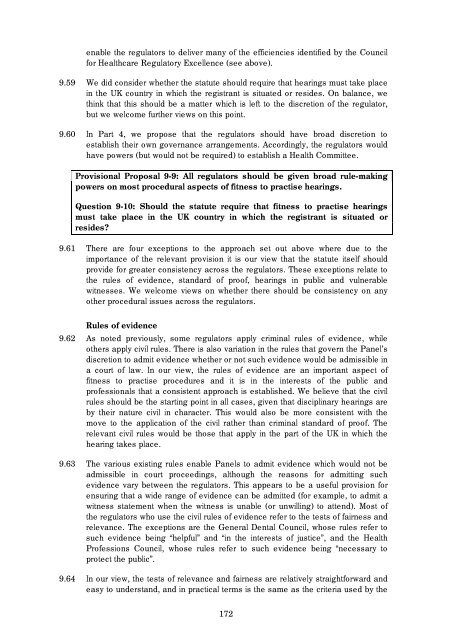Regulation of Health and Social Care Professionals Consultation
Regulation of Health and Social Care Professionals Consultation
Regulation of Health and Social Care Professionals Consultation
You also want an ePaper? Increase the reach of your titles
YUMPU automatically turns print PDFs into web optimized ePapers that Google loves.
enable the regulators to deliver many <strong>of</strong> the efficiencies identified by the Council<br />
for <strong>Health</strong>care Regulatory Excellence (see above).<br />
9.59 We did consider whether the statute should require that hearings must take place<br />
in the UK country in which the registrant is situated or resides. On balance, we<br />
think that this should be a matter which is left to the discretion <strong>of</strong> the regulator,<br />
but we welcome further views on this point.<br />
9.60 In Part 4, we propose that the regulators should have broad discretion to<br />
establish their own governance arrangements. Accordingly, the regulators would<br />
have powers (but would not be required) to establish a <strong>Health</strong> Committee.<br />
Provisional Proposal 9-9: All regulators should be given broad rule-making<br />
powers on most procedural aspects <strong>of</strong> fitness to practise hearings.<br />
Question 9-10: Should the statute require that fitness to practise hearings<br />
must take place in the UK country in which the registrant is situated or<br />
resides?<br />
9.61 There are four exceptions to the approach set out above where due to the<br />
importance <strong>of</strong> the relevant provision it is our view that the statute itself should<br />
provide for greater consistency across the regulators. These exceptions relate to<br />
the rules <strong>of</strong> evidence, st<strong>and</strong>ard <strong>of</strong> pro<strong>of</strong>, hearings in public <strong>and</strong> vulnerable<br />
witnesses. We welcome views on whether there should be consistency on any<br />
other procedural issues across the regulators.<br />
Rules <strong>of</strong> evidence<br />
9.62 As noted previously, some regulators apply criminal rules <strong>of</strong> evidence, while<br />
others apply civil rules. There is also variation in the rules that govern the Panel’s<br />
discretion to admit evidence whether or not such evidence would be admissible in<br />
a court <strong>of</strong> law. In our view, the rules <strong>of</strong> evidence are an important aspect <strong>of</strong><br />
fitness to practise procedures <strong>and</strong> it is in the interests <strong>of</strong> the public <strong>and</strong><br />
pr<strong>of</strong>essionals that a consistent approach is established. We believe that the civil<br />
rules should be the starting point in all cases, given that disciplinary hearings are<br />
by their nature civil in character. This would also be more consistent with the<br />
move to the application <strong>of</strong> the civil rather than criminal st<strong>and</strong>ard <strong>of</strong> pro<strong>of</strong>. The<br />
relevant civil rules would be those that apply in the part <strong>of</strong> the UK in which the<br />
hearing takes place.<br />
9.63 The various existing rules enable Panels to admit evidence which would not be<br />
admissible in court proceedings, although the reasons for admitting such<br />
evidence vary between the regulators. This appears to be a useful provision for<br />
ensuring that a wide range <strong>of</strong> evidence can be admitted (for example, to admit a<br />
witness statement when the witness is unable (or unwilling) to attend). Most <strong>of</strong><br />
the regulators who use the civil rules <strong>of</strong> evidence refer to the tests <strong>of</strong> fairness <strong>and</strong><br />
relevance. The exceptions are the General Dental Council, whose rules refer to<br />
such evidence being “helpful” <strong>and</strong> “in the interests <strong>of</strong> justice”, <strong>and</strong> the <strong>Health</strong><br />
Pr<strong>of</strong>essions Council, whose rules refer to such evidence being “necessary to<br />
protect the public”.<br />
9.64 In our view, the tests <strong>of</strong> relevance <strong>and</strong> fairness are relatively straightforward <strong>and</strong><br />
easy to underst<strong>and</strong>, <strong>and</strong> in practical terms is the same as the criteria used by the<br />
172
















